I expect to lose
‘Before every match I expect to lose. I am petrified and it cripples me’
From The Times
September 6, 2007
For a man who has collected two world titles, the inner demons and feelings of failure are never far away. He is at a loss to explain why
Matthew Syed
“In a way, the most unhelpful thing you can do is examine the depressive’s situation logically because depression has nothing to do with logic” – From Ronnie, the autobiography of Ronnie O’Sullivan
Ronnie O’Sullivan has never been short of advice. In 2001 his doctor told him that his depression stemmed from a lack of serotonin in the brain and prescribed a daily dose of Prozac. In 2002 a therapist from the National Drugs Helpline told him that his problems were the consequence of his addiction to marijuana and that if he kicked his habit he could kick his demons.
A counsellor from the Samaritans – which O’Sullivan had called in a state of fevered desperation on the eve of the World Championship in 2001 – told him that it was all about his destructive relationship with snooker and that if he quit, things would start to look up. A sports psychologist who worked with O’Sullivan told him that his problems were to do with focus.
O’Sullivan has that effect on people: everyone wants to help, to advise him, to get inside his head and make things better. Maybe it is that irresistible combination of eccentricity and vulnerability. Maybe it is his roguish humour and immense personal warmth.
Whatever it is, people want to reach out and attempt to understand him. For every friend and acquaintance there is an opinion on what is wrong and what to do about it.
But it was Mike Brearley, the former England cricket captain and now a psychotherapist, who offered O’Sullivan the most novel perspective. “Is your dad right-handed?” he asked O’Sullivan after he had confessed to problems with his cue action during one of their therapy sessions in 1998. O’Sullivan nodded.
“So that means there’s a good chance he stabbed the man he killed with his right hand,” Brearley said. “Maybe what happened in the club that night is affecting your right arm. There were people in the war years ago who were made to shoot people and didn’t want to do it. Years later their arms became paralysed.”
Brearley reasoned that if O’Sullivan could come to terms with the night his father knifed a man to death, it would solve his cueing problems, which would help him to feel better about life. It was Freudian logic that, to quote O’Sullivan, “was off the wall and did my head in for a long time”.
O’Sullivan, 31 with a steady partner and three children, is no closer to understanding why his world is shrouded in darkness. “A lot of the time I am in pieces and I still don’t know why,” he says as we sit alongside each other in the bar at Grove Snooker Club in Romford, Essex.
“Some days I think one thing, the next day I think something else. It is like there is this damn committee going on in my head. Shall I; shan’t I; am I up or am I down; am I doing the right thing; should I carry on; should I go home; have I done enough; have I had enough; do people really care; do I hate snooker; do I love snooker; have I had a good time; has it been great; hasn’t it been great; is it time to move on; have I got another five years in me; should I give up now. Arrrrgh! I’ve got all this s*** in my head to deal with.”
Did the antidepressants help? “For a while, yes,” he says. “I started taking them at the start of the World Championship in 2001 and they helped me to get through that event [his first world title] because I was ready to walk out of Sheffield at the beginning of the competition, I was feeling so bad. I carried on taking them for around nine months. When I came off them, I went back to the up-and-down mood swings.”
Why not try them again? “I never really wanted to take them in the first place because I had read things about people who had come off them and ended up in a bad way and it kind of frightened me. I don’t want to end up suicidal because of the medication. I can handle being suicidal if the buck stops with me, but I hate the idea of going up the spout because of something I’ve taken. If I can blame myself, I can deal with that. I like to be hard on myself. Maybe that’s one of my problems. No matter what happens I always feel like a failure.”
That sounds strange, given what he has achieved on the snooker table.
“But I am a complete failure,” he says. “I feel lucky to have won two world titles, but I feel robbed because that’s all I won. If I had a bit of consistency in my game I would have never got beat by [Graeme] Dott [in the semi-finals of the 2006 World Championship] or [Peter] Ebdon [from 8-2 up in the quarter-finals in 2005].
“I threw away two titles because I wasn’t strong in myself, because I couldn’t take it. I know I was capable of challenging [Stephen] Hendry’s record [seven world titles]. But I haven’t produced. How can I be anything other than a failure?”
Is Hendry’s record that important to him?
“Yes. No. I don’t know,” he says and giggles mirthlessly. “People say I am full of contradictions and they are right. I’m a walking contradiction. One day I’m up, one day I’m down. One day something is important, the next day it ain’t. On some days I don’t even try to analyse what’s going on in my mind because I haven’t got the slightest idea. I know it must be a nightmare for people who are close to me. But at least I am open about it all.”
Open enough to talk about his father?
It is the autumn of 1991 and O’Sullivan is in Thailand for the World Amateur Championship. It has been an audacious period for the 15-year-old potting machine, with a series of victories in pro-am matches and a runners-up medal at the English Amateur Championship. His precocity has secured a three-year deal with Barry Hearn, snooker’s most influential promoter, and he is enjoying the thrill of travelling around the world playing exhibition matches and tournaments. The phone rings in his hotel room and his mother comes on the line. As she talks, O’Sullivan’s stomach begins to tighten. “I’ve got some news to tell you,” she says. “I don’t want you to do anything, everything’s all right. But Daddy’s been arrested. He’s in police custody. He’s been involved in a fight and someone’s been killed.”
O’Sullivan flies back to the UK, where he is met by his mother and taken to the prison where his father is on remand. O’Sullivan looks at the man who has been the centre of his existence – a charismatic rogue who had built a lucrative chain of Soho sex shops from nothing – kitted out in standard prison garb. Then it hits him; he breaks down in tears.
For the first time in his life, O’Sullivan notices a tear escaping the eye of his father.
On September 21, 1992, O’Sullivan Sr was convicted of the murder of Bruce Bryan, a driver for Charlie Kray, the elder brother of the Kray twins.
Accounts vary, but what is certain is that the stabbing took place after an argument in a Chelsea nightclub. Summing up, the judge implied that the attack was racially motivated, a contention that was overturned in a sentence review in 2003. O’Sullivan Sr has two years of his 18-year minimum sentence to serve. The only contact between father and son for the past 16 years has been by phone or in a prison visiting room.
For many years, O’Sullivan Jr was unable or unwilling to examine the extent to which his descent into mental illness was related to his enforced separation from his father, who had lavishly financed his snooker career and provided him with discipline and inspiration. It was only recently, while leafing through the diaries he had kept as an adolescent, that O’Sullivan began to realise how much he has changed in the years since his father’s conviction.
“I found the diaries and just started to look through them,” he says. “And I had written stuff like, ‘Got to the quarters of this tournament, got to the semis of that tournament.’ But I wasn’t down on myself because I was losing. There was stuff like, ‘I need to start winning and it will happen soon.’ And I thought to myself, ‘F***ing hell, that don’t sound like me.’ I must have been about 12 at the time.
“I would never think something like that now. Now when I lose it’s, like, ‘Doom, gloom, playing s***, can’t pot a ball.’ It’s difficult to believe that I used to have so much belief and optimism. Back then I knew I was untouchable. Now I never think it’s going to happen for me. Before every match I expect to lose. I am petrified and it cripples me. Unless there are 4,000 people watching or it is the world final, I can’t do it. If I am not flowing in the first round I feel like throwing the towel in.
“It’s like when I played Dott in the semis [in 2006]. My game started to deteriorate and I thought, ‘I’ve got three days against him and if I get through that I’ve got two days against Ebdon.’ And I just didn’t have it in me. That really cuts me up because years ago that would never have entered my mind. I would have thought, ‘Just get through this game.’ Back then I knew it was going to turn around.”
For a long time after the conviction of his father, O’Sullivan tried to numb his feelings of fear, guilt and self-loathing by using marijuana and alcohol, but it sent him into a downward spiral of intoxication and paranoia. In 2000 he realised that he was out of control and pulled out of the UK Championship to check into the Priory Hospital in Roehampton, southwest London.
“It was a nightmare,” he says. “If it hadn’t been for the month in the Priory I don’t know what would have happened. It gave me some space from all the madness. Talking in groups helped me to understand how bad things could become if I didn’t get it under control. I also went to Narcotics Anonymous, where I met Jo [his partner and the mother of two of his three children]. She doesn’t really get my depression, but she relates to the addiction problems. Bloody good thing, too.”
I ask if he is still off the dope and booze. “I occasionally fall off the wagon,” he says. “The last time I had a drink was on the Sunday of the world final [in May]. I remember getting up and thinking, ‘You wouldn’t be feeling so bad if you were in the world final.’ We went out to a restaurant and I ended up having a few. I am not perfect, but it is under control, at least compared to how it was.
“I go through phases of trying to find out what’s the bloody answer. I am very into seeking other people’s philosophy on life, just to get a handle on my own problems. I looked into Buddhism and Islam, but I haven’t really bought into any of them. I still have demons and it drives me mad every day. I guess the thing is just to deal with things as they come. Maybe that’s the only way forward.”
Ronnie O’Sullivan faces a stern test in his opening match of the PartyBets.com Premier League, which starts in Haywards Heath, West Sussex, today. O’Sullivan, who has won the competition on the past three occasions, will play John Higgins, the world champion. (Ronnie won 5-1)
O’Sullivan’s remarkable success in the league – he won the past three finals without dropping a frame – has led many to speculate that the format of the event suits his psychological profile. Because the seven-man competition is played over three months, O’Sullivan is never required to spend more than a night away from home.
This contrasts with, say, the World Championship, which requires an 18-day stint in Sheffield. This has never been an easy feat for O’Sullivan, who often takes solitary walks late at night to fend off the boredom and demons.
29. 4. Robert
Návštěvnost stránek
ANTEE s.r.o. - Tvorba webových stránek, Redakční systém IPO

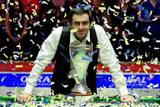
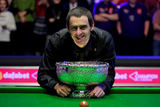
![Welsh Open[2].jpg](image.php?nid=1380&oid=3689245&width=160&height=174)
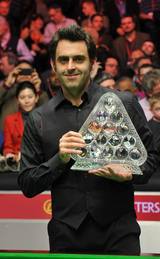

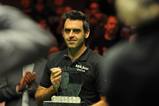
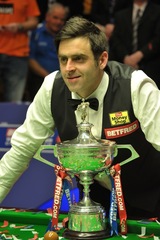
![Ronnie_OSullivan_Snooker_Champion_PTC7_2011[2].jpg](image.php?nid=1380&oid=2439625&width=160&height=151)
![topimage[2].jpg](image.php?nid=1380&oid=2498497&width=160&height=141)
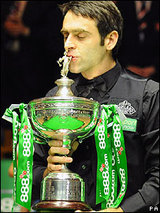
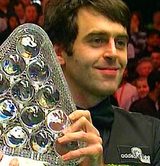
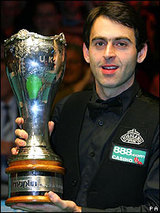

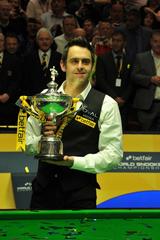

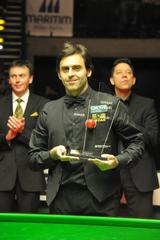
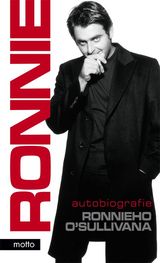
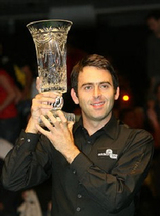
![08%20pls%20ronnie%20trophy[3].jpg](image.php?nid=1380&oid=1189442&width=160&height=198)
